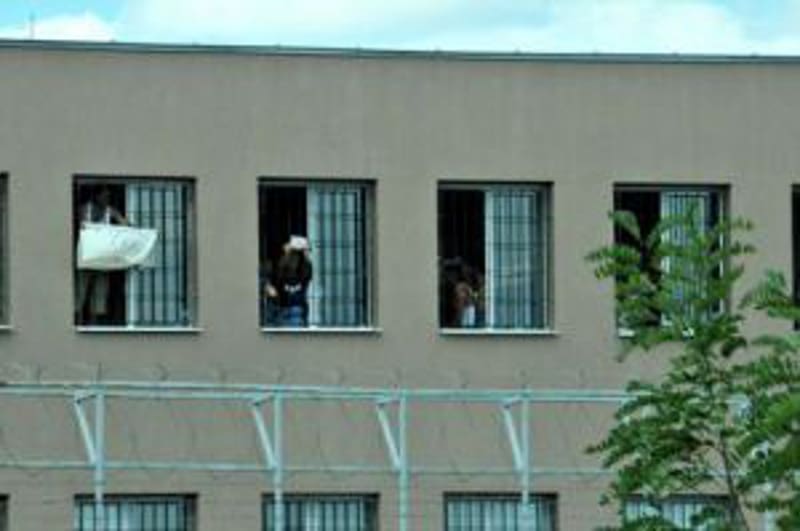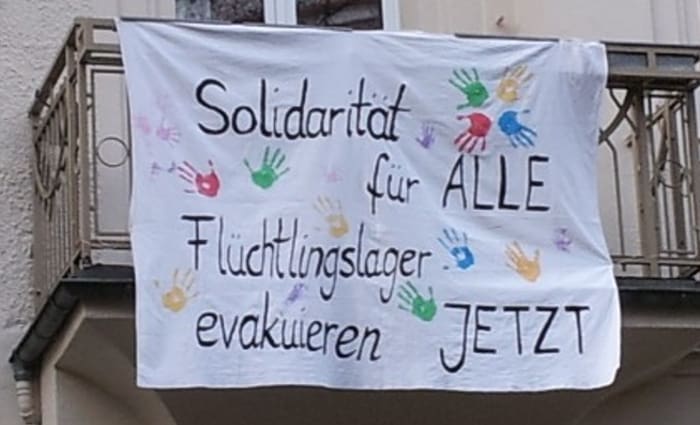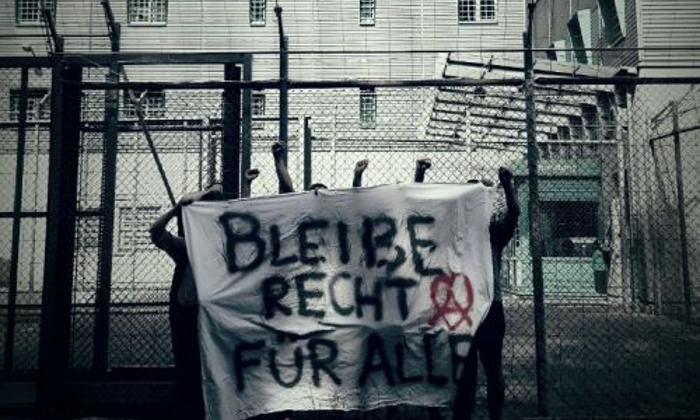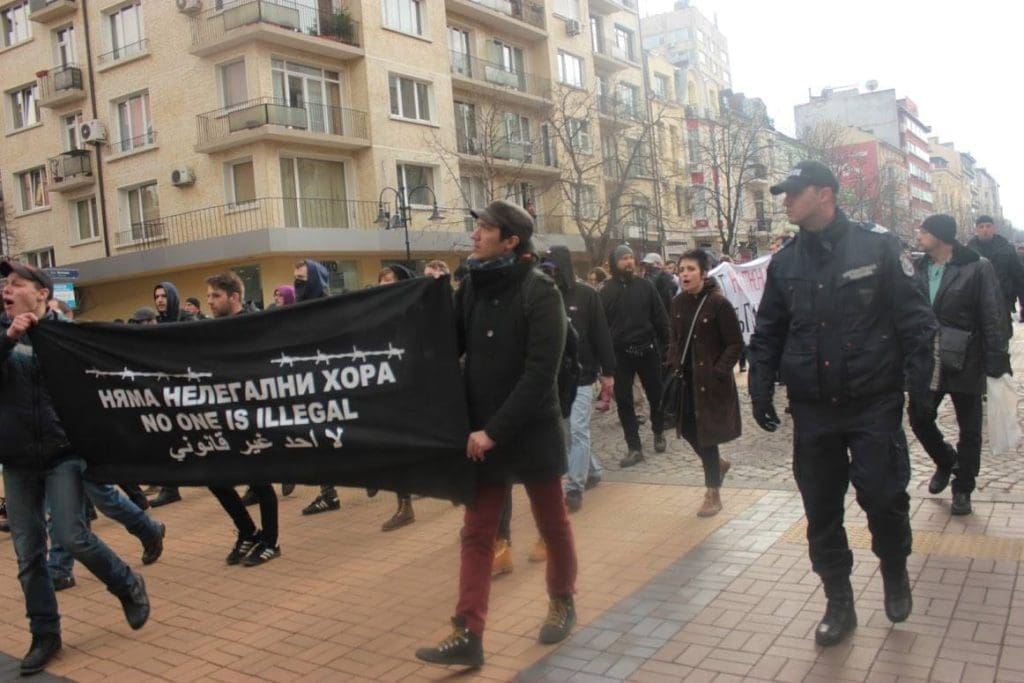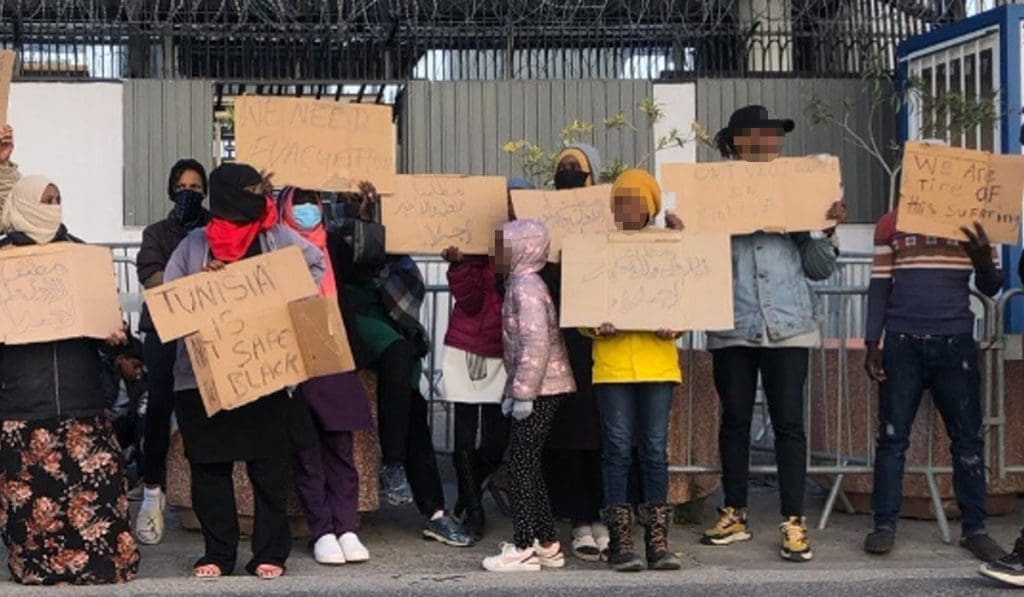AntiNote: this article was the result of a recent collaboration between LeftEast and the new Balkan web portal Bilten.org, where it can be read in Serbo-Croatian. It appeared in the original English last week on LeftEast. Reprinted with permission.
“While the EU proclaims democracy and universal human rights, a new form of nationalism is on the rise – one that is not founded in the nation-state but is instead fortifying the wealthy core member-states by turning the periphery into an alert border zone.”
by Tsvetelina Hristova and Raya Apostolova
When Greece began construction of a wall along its border with Turkey in 2012, nationalist formations in Bulgaria voiced the same demand for the country’s southern border. Back then, this demand seemed comic at best and was ridiculed throughout the political spectrum. Two years later, a barbed-wire fence along the Turkish-Bulgarian border is a nationalist dream-come-true.
In October 2013, after approximately one month of increased flow of asylum seekers through the Bulgarian-Turkish border, the Bulgarian Parliament announced its plans to build a 36km-long fence along the border with Turkey. The decision was precipitated by various nationalist protests, among them a demonstration led by representatives of the nationalist party VMRO—culminating in an attempt to seal off the border in September 2013. The fence is supposed to limit access to Bulgarian—and thus EU—territory by funneling border-crossers toward legitimate checkpoints.
To date, the fence has not been constructed—though not because of opposition from national and international organizations or public opinion. The sole focus of public and political debates about the future wall center on suspicions of corruption and abuse of public office that surfaced after the initial price of approximately 5 million leva (roughly 2.5 million euro) almost doubled to over 9 million in February. The funding for this enterprise has been secured through restructuring of the national budget and through EU funds.
Actually, the “refugee drum” is not beating for the first time in Bulgaria. Negotiations surrounding Bulgaria’s potential accession into Schengen structures have always used border-crossers as bargaining chips in arguing for the country’s capacity to secure European borders.
Back in 2011, when Bulgaria still received a relatively small number of asylum applications, then-Prime Minister Boyko Borisov told the Bulgarian public that he would not be able to secure the country’s territory from “illegals” if we were not accepted into Schengen. This threat was also addressed to Western European countries, implying that large numbers of “illegals” would be headed their way.
Political hesitancy towards Bulgaria’s accession into the Schengen Agreement, however, has more to do with the expected increase in the number of border crossings from Greece – a Schengen member since 1992– into Bulgaria, from where entry into Western Europe is easier. The ongoing attempts to seal Bulgaria’s border follow the same logic to a large extent. If the Bulgarian political class can prove its ability to defend European borders, they have a better chance to be taken seriously during the next round of negotiations.
Since the so-called “refugee crisis” began, efforts have been directed towards preventing access to Bulgarian territory. In November 2013, 1400 police officers were sent to the border to assist their colleagues from Border Police in hunting “illegals.” According to media reports, one could spot police officers and border guards every few hundred meters along the border.
Results came quickly. In November of 2013, 1,652 people crossed the border—compared with 3,626 people in October. Only a few hundred made it across in December, and only 50 in January 2014 (in January 2013, that number was 193).
Push-backs at the border also take place. In December it became clear that police officers were not given clear instructions on how to deal with people who attempt to cross the border. In a report made by Bulgarian National Television, it surfaced that border guards were instructed to “beat [border-crossers] and return them to Turkey.”
The army has also been mobilized to secure the border in missions described vaguely by the Minister of Defense as “involvement of the army in accordance with its lawful functions, with staff and equipment, following the Plan for limiting the flow of third-country citizens into the territory of the country.”
This spectacle of semi-legal measures aimed at blocking the entry of asylum-seekers has been silently watched by the Frontex border guards working in close collaboration with their colleagues in Bulgaria since the expansion of the Frontex Poseidon program in 2011. From the outset of the increased flow of asylum seekers in 2013, the EU has offered support in terms of expertise, which consists of placing Frontex staff at the border who have since been consenting witnesses to all the reported cases of pushbacks and other violations of the rights of asylum seekers.
All this institutionally-driven manpower sealing off the border—combined with nationalist protests, local demonstrations against the building of camps for refugees throughout the country, and inadequate asylum policies—creates a much more effective barricade against asylum seekers than could be hoped for from any border wall.
That the European Union’s alleged attempts to challenge the actions of the Bulgarian government have been lukewarm at best clearly demonstrates the larger political consensus throughout Europe, which regards asylum seekers as criminals to be kept at bay. European policies have long been oriented toward prevention of access to European territories, deportations, and socio-economic and political quarantine of subjects deemed migrants. Peripheral European countries such as Bulgaria have come to embody the true meaning of Fortress Europe: the political and social isolation of an emerging underclass which is segregated in camps and has no option but “illegal” participation in the economic sphere.
With the recent signing of the “readmission treaty” between the EU and Turkey, the border triangle between Greece, Turkey and Bulgaria will more than ever exemplify a cat-and-mouse game in which Western European countries will be the sole winners. Increased social unrest in these “triangle” countries and the rapid creation of a migrant underclass, however, signal that so-called European solidarity needs conceptual revision. It should not be locked solely in balancing refugee numbers but must address the rapidly growing socio-economic gap between different social classes.
We can already see in our nightmares a physical wall metastasizing along the external borders of the Union alongside the less visible fences that obstruct the access of migrants to social and political rights. While the EU is proclaiming democracy and universal human rights, a new form of nationalism is on the rise – one that is not founded in the nation-state but is instead fortifying the wealthy core member-states by turning the periphery into an alert border zone. This kind of nationalism is based on protecting and perpetuating economic inequalities—as seen, for example, in the reframing of internal free movement as welfare abuse and in the image of gated communities locking themselves away from the increasing poverty of the surrounding slums.
Image: Migrant Detention Center in Lyubimetz, Bulgaria. Source: No Borders North East

